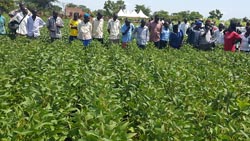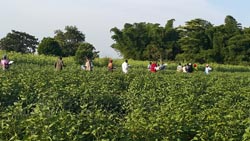Public private partnership (PPP) is a co-operative venture between the public and private sectors on the basis of expertise of each partner. A PPP meets clearly articulated public needs through the appropriate allocation of resources, risks and rewards. This approach is guided by four important pillars: capacity building, awareness creation and dissemination, information to support input supply and output markets. The N2Africa project and World Vision Uganda (WVU) both see the PPP approach as an exit strategy to sustain development interventions and address the chronic dependency syndrome in the communities where they work.
Both the N2Africa project, and the WVU’s Food security and Community Resilience Programme seek to contribute to improved food and livelihood security amongst the most vulnerable farming communities through increased agricultural production and productivity, and improved nutrition and incomes. WVU and N2Africa agreed that strengthening the competitiveness of the smallholders is the appropriate approach to meet the desired goals of improved food and livelihood security. This led to a joint project on strengthening the capacity of smallholders to engage in value chains of grain legumes for improved livelihood security and incomes.
Aligning the N2Africa goals with the strategic objective of WVU led to collaboration with more partners because diverse knowledge and skills were required and could only be met by partnering with public and private organisations. N2Africa linked WVU with the following partners:
- Integrated Seed Systems Development (ISSD) builds the capacity of farmer groups in local seed businesses to fill the critical gap of availability of quality seed. WVU and ISSD Wageningen University signed a memorandum of understanding (MOU). Some seed money is provided to the farmer groups to start up the seed businesses as well. Other partners such as the Ministry of Agriculture Animal Industry and Fisheries (MAAIF) are included for inspection and certification of quality declared seed.
- The National Research Systems build capacity and backstop WVU staff and farmer organizations in legume agronomy and experimentation (NARO-NARL) and management of inoculants N2Africa (Makerere University). N2Africa is giving some funding support through sub-agreements.
- AgriNet is a private sector organization that buys soyabean. AgriNet is providing basic post-harvest training to farmers to achieve the desired grain quality. It also guarantees the price of soyabean and establishes bulking centres. They have placed a demand of 300MT of soyabean per season. An MoU was signed as well.
World Vision Uganda also took up some of the aspects for strengthening the linkages:
- Co-funding farmer institution development to address the collective marketing and business skills development. WVU engaged Uganda Co-operative Alliance to train farmer organizations and made linkages to microfinance institutions to access agricultural credit for farmer groups.
- Establishing an MoU with PlantWise to address the issues of pest and disease management.
- Establishing an information sharing system including a portal and quarterly reflection meetings to keep partners informed and regularly review the joint action plan.
- Engaging the district local governments (DLG) in Oyam and Kole to mobilize communities to implement the project in line with the government goal of combating poverty and increasing household incomes through agriculture.
 |
Left: Farmers being taken through the different treatments of the soyabean demo during the field day in Oyam District Right: Farmers evaluating the soyabean technologies of the demo garden managed by World Vision Uganda in Oyam District. |
 |
Although the approach used does not embody all the PPP development steps, it already provides some lessons: a need for major re-adjustments in mindsets to work jointly, clear definition of roles to work effectively and efficiently and continuous capacity building for farmers and partners.
Whereas N2Africa is already facilitating the creation of partnerships and directly signs partnership agreements with various organizations, we are looking forward to the time farmers will be able to engage these partners on their own. We envisage that the current partnerships develop into a public private partnership where all partners will be accountable to each other and where there are clear roles and responsibilities, leading to the achievement of the common goals and targets.
By Connetie Ayesiga, BDO N2Africa, IITA Uganda & Dorcas Adrale, Partnerships Specialist, World Vision Uganda
